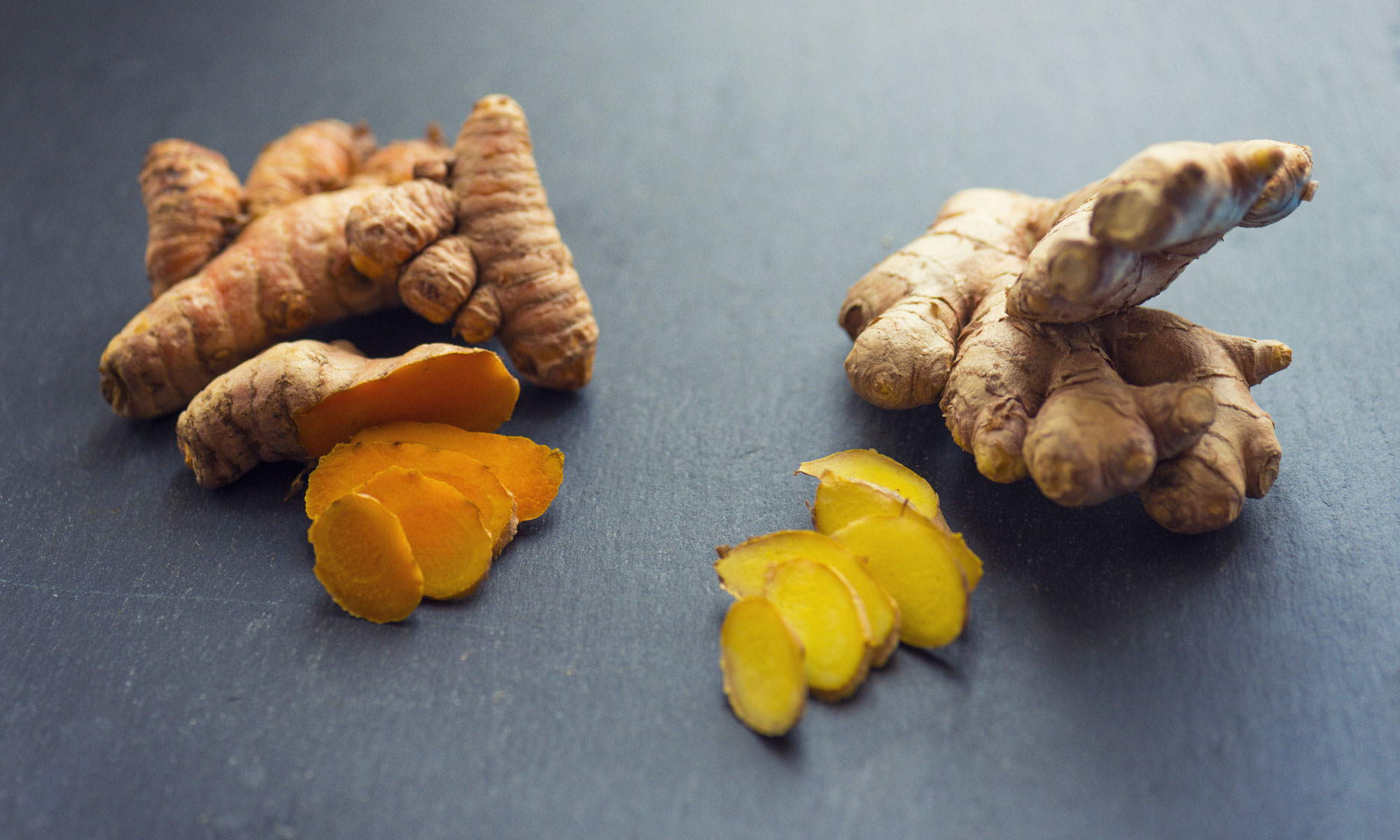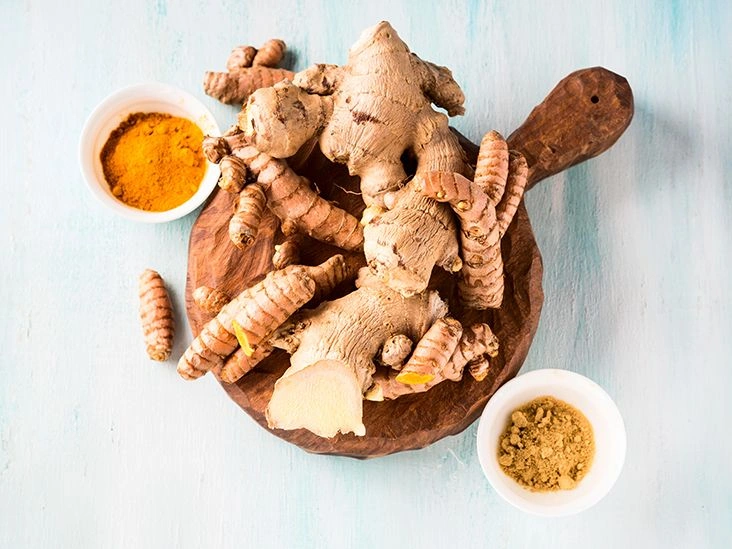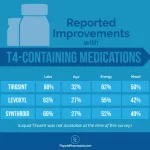Ginger and turmeric have both been employed for centuries to address a wide range of ailments, from migraines to persistent inflammation and chronic fatigue.
These two ingredients rank among the most researched in the realm of herbal remedies.
They’ve both been used to ease pain, lessen nausea, and support immune defenses to help stave off illness and infection.
This piece examines the advantages and adverse effects of ginger and turmeric, and whether they may help combat pain and sickness.
What are ginger and turmeric?

Ginger and turmeric are flowering plants commonly utilized in traditional medicine.
Ginger, or Zingiber officinale, hails from Southeast Asia and has a long history as a natural treatment for various health issues.
Its therapeutic effects are largely attributed to phenolic compounds such as gingerol, a substance believed to have strong anti-inflammatory and antioxidant actions.
Turmeric, or Curcuma longa, is related botanically and is frequently used as a spice in South Asian cuisine.
It contains curcumin, a compound shown to help treat and prevent multiple chronic illnesses.
Both can be eaten fresh, dried, or ground and incorporated into numerous dishes. They are also sold as dietary supplements.
SummaryGinger and turmeric are flowering plants with medicinal qualities. Both can be consumed in different forms and are available as supplements.
Have properties that help with pain and sickness
Although data on combined use is limited, research indicates that both ginger and turmeric may help lessen pain and symptoms of sickness.
Reduce inflammation
Chronic inflammation is believed to be a key contributor to diseases like cardiovascular disease, cancer, and diabetes.
It can also exacerbate symptoms of autoimmune disorders such as rheumatoid arthritis and inflammatory bowel disease.
Ginger and turmeric exhibit potent anti-inflammatory effects, which may help ease pain and lower disease risk.
In one trial of 120 adults with osteoarthritis, 1 gram of ginger extract daily for 3 months reduced inflammation and lowered nitric oxide levels, a molecule involved in the inflammatory cascade.
Likewise, a review of nine trials found that 1–3 grams of ginger per day for 6–12 weeks reduced C-reactive protein (CRP), an inflammation marker.
Test-tube and human research suggests turmeric extract can lower various inflammatory markers, with some studies indicating effectiveness comparable to anti-inflammatory drugs like ibuprofen and aspirin.
A review of 15 studies observed that turmeric supplementation could decrease CRP, interleukin-6 (IL-6), and malondialdehyde (MDA), all used to assess inflammation.
Relieve pain
Both spices have been investigated for their capacity to reduce chronic pain.
Curcumin, the active compound in turmeric, has shown particular promise in easing arthritis-related pain.
A review of eight trials reported that 1,000 mg of curcumin was as effective as certain pain-relief drugs for reducing joint pain in people with arthritis.
In a small study of 40 osteoarthritis patients, 1,500 mg of curcumin daily significantly lowered pain and enhanced physical function versus placebo.
Ginger has also demonstrated pain-reducing effects in arthritis and other conditions.
For instance, a 5-day trial with 120 women found that taking 500 mg of ginger root powder three times daily reduced the severity and length of menstrual cramps.
Another study with 74 participants showed that 2 grams of ginger for 11 days significantly diminished exercise-induced muscle pain.
Support immune function
Many people reach for turmeric and ginger at the first signs of illness, hoping to bolster immune defenses and avoid colds or the flu.
Some evidence suggests ginger, in particular, may have strong immune-supporting properties.
A test-tube study demonstrated that fresh ginger was effective against human respiratory syncytial virus (HRSV), which can cause respiratory infections in infants, children, and adults.
Another in vitro study showed ginger extract inhibited growth of various respiratory pathogens.
An animal study found that ginger extract suppressed activation of pro-inflammatory immune cells and reduced symptoms of seasonal allergies, such as sneezing.
Similarly, lab and animal research indicate curcumin has antiviral effects and may lessen the severity of influenza A.
Both turmeric and ginger can also lower inflammation, which may support immune function.
However, much of the research relies on cell and animal models using concentrated extracts.
Further studies are required to clarify how typical dietary amounts affect human immune health.
Decrease nausea
Numerous studies suggest ginger can effectively calm the stomach and reduce nausea.
One trial of 170 pregnant women found 1 gram of ginger powder daily for a week matched the effectiveness of a common anti-nausea drug but caused far fewer side effects.
A review of five studies indicated that at least 1 gram of ginger per day significantly decreased postoperative nausea and vomiting.
Other work shows ginger can reduce nausea from motion sickness, chemotherapy, and some gastrointestinal disorders.
While research on turmeric’s effect on nausea is more limited, some studies suggest it may protect against chemotherapy-induced digestive problems, potentially lessening nausea, vomiting, and diarrhea.
SummaryEvidence suggests ginger and turmeric might reduce inflammatory markers, ease chronic pain, curb nausea, and bolster immune function.
Potential side effects
When consumed in moderation, both ginger and turmeric are generally safe and can be part of a healthy diet.
Still, there are some potential adverse effects to be aware of.
Research indicates ginger may inhibit blood clotting and could interact with anticoagulant medications if taken in large quantities.
Because ginger can also influence blood sugar, individuals on glucose-lowering drugs should consult a healthcare professional before starting supplements.
Remember, turmeric powder typically contains only about 3% curcumin by weight, so achieving study-level doses from culinary turmeric would require very large amounts or a supplement.
High doses of curcumin have been linked with side effects such as rashes, headaches, and diarrhea.
Finally, although there is abundant research on the health effects of each spice individually, data on their combined use is limited.
Always consult your healthcare provider before starting supplements and reduce dosage if you experience adverse effects.
SummaryGinger can reduce blood clotting and lower blood sugar. High amounts of turmeric/curcumin may cause rashes, headaches, and diarrhea.
How to use ginger and turmeric
There are many ways to incorporate ginger and turmeric into your meals to tap into their health benefits.
They pair nicely in dressings, stir-fries, and sauces, adding both flavor and nutritional advantages to your favorite recipes.
Fresh ginger can be used to make concentrated “ginger shots,” brewed into tea, or added to soups, smoothies, and curries.
Ginger root extract is sold as a supplement, often found to be most effective in doses between 1,500–2,000 mg daily.
Turmeric adds bright color and subtle flavor to dishes such as casseroles, frittatas, dips, and dressings.
Pairing turmeric with a pinch of black pepper can dramatically enhance absorption—by up to 2,000% in some studies. For guidance on appropriate supplement amounts, see turmeric dosage.
Turmeric supplements can deliver a concentrated curcumin dose and are sometimes taken as 500 mg twice daily to reduce pain and inflammation.
Combination supplements containing both turmeric and ginger are also available, offering an easy single-dose option.
These supplements can be purchased locally or bought online.
SummaryBoth spices are simple to add to meals and are available fresh, dried, or as supplements.
The bottom line
Many promising studies indicate ginger and turmeric can positively influence nausea, pain, inflammation, and immune responses.
However, evidence on their combined use remains sparse, and much of the research stems from laboratory studies.
Nonetheless, both spices can be a beneficial and low-risk addition to a balanced diet when used sensibly.

























Leave a Reply
You must be logged in to post a comment.